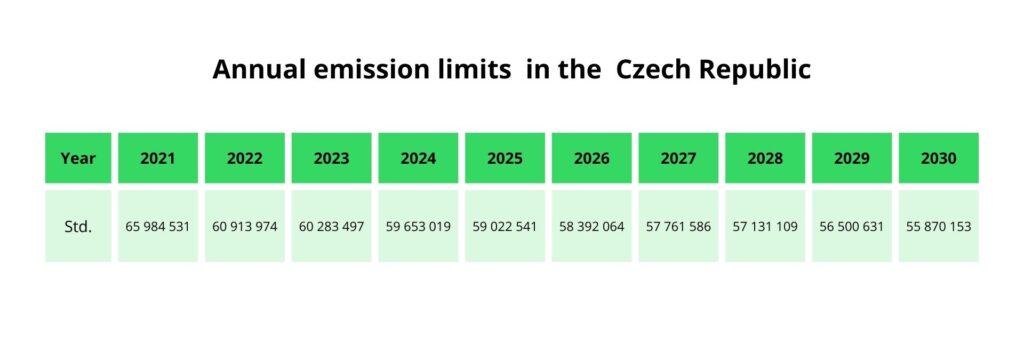Environmental sustainability and ecological transition are crucial issues that affect the future of all of us. It is not just a fad or a trend, but an urgent necessity. We live in an interconnected world, where the actions of one country can have global impacts.
EU Efforts for the Ecological Transition
The EU and the United Nations are actively involved in creating a better and safer world for all. It is therefore in the EU’s interest to play a leading role in implementing the UN 2030 Agenda.
To overcome these challenges, the Green Deal, a Europe-wide policy initiative, aims to transform the EU into a modern, resource-efficient, and competitive economy by making it carbon-neutral. To this end, the Effort Sharing Regulation was prepared, which sets a national target for each EU state to reduce greenhouse gas emissions by 2030 by at least 55 % compared to 1990. The regulation recognizes the different possibilities and capacities of member states to take action. Consequently, the targets have been arranged differentially among states based on their GDP per capita in order to ensure equity within the EU.
The regulation, which is valid for the decade 2021-2030, was published on July 9, 2021, but in 2023 it underwent some changes. In the case of the Czech Republic, it changed from a 14% emissions reduction target to a 26% reduction.
The regulation also defines annual emission limits year by year from 2021 to 2030. These quotas referring to the Czech Republic are set as follows:

However, EU states are not left alone on this path as the European Commission annually assesses and reports on their progress toward meeting the targets. If a member state is not on track, it is suggested a turnaround.
The 2030 target actually turns out to be part of a larger project whose ultimate goal is to achieve climate neutrality, as the first continent, by 2050. This implies achieving net zero greenhouse gas emissions for EU countries as a whole, mainly by cutting emissions, investing in green technologies, and protecting the natural environment. This goal, being set by European law, has legally binding validity. Therefore, EU institutions and member states are required to take the necessary measures both at the EU and national levels.
All sectors are involved in this process of ecological transition, from the aviation sector and the maritime sector to the construction and household sectors. The latter contribute significantly to the overall ecological footprint of the European Union, exerting considerable pressure on the environment and playing a key role in climate change.
Household activities such as air conditioning, using household appliances, and disposing of household waste generate greenhouse gas emissions, consume natural resources, and contribute to various forms of pollution. Efforts to mitigate the environmental impact of the household sector often focus on adopting more sustainable practices, energy efficiency, and the use of renewable energy sources.
Therefore, the Green Deal includes several measures and actions aimed at improving energy efficiency and reducing CO2 emissions associated with the construction and use of buildings. Planned initiatives include:
- Renovation of existing buildings. Promote energy renovation of existing buildings to make them more energy efficient by installing better insulation, energy-efficient windows, and more efficient heating and cooling systems;
- Construction of zero-emission buildings. Incentivize the design and construction of new buildings that meet high standards of energy efficiency and are capable of producing or consuming renewable energy on-site, thereby reducing carbon emissions associated with the entire life cycle of buildings;
- Use of sustainable materials. Promote the use of low-impact, energy-efficient building materials and reduce the use of traditionally high-impact materials such as concrete;
- Digitization and innovation. Use digital and innovative technologies to improve the design, construction, and management of buildings;
- Promotion of sustainable construction practices. Raise awareness and train construction professionals on sustainable practices, promoting energy certification of buildings, development of sustainability skills, and sharing of best practices.
A requirement for member states to renovate at least 3% of the total area occupied by the central government-owned buildings was also extended to all levels of government.
Incentives for the green transition in the Czech Republic: A focus on the household and real estate sectors
The European Commission allocates funds to finance projects related to the ecological transition of member states. In the Czech Republic, the SEF is the official fund for financing projects aimed at sustainable development and the protection of future generations and acts as an intermediary between the EU and the Czech state.
The State Environmental Fund of the Czech Republic (SEF), established in 1992, is a key pillar in the landscape of state institutions in the environmental sector, playing a significant role in investments aimed at protecting and improving the environment.
It is financed through various sources, including European Union funds such as the Cohesion Fund, the European Regional Development Fund, and the Next Generation EU Fund, as well as the state budget and taxes collected from polluters.
The SEF offers extensive support through an established network of highly qualified consultants and project managers who ensure a fair evaluation of applications and a rapid process for the disbursement of approved grants.
The real estate sector in the Czech Republic is significantly influenced by the operations and funding provided by the SEF that highlight the importance of sustainable investments in real estate. This sector in the Czech Republic benefits from these financial mechanisms which facilitate investments in sustainable infrastructure and green building practices.
The involvement of the Czech real estate industry in the SEF objectives is instrumental in achieving the country’s environmental goals, demonstrating the intertwined relationship between real estate and sustainable development in the Czech Republic.
The article goes on by analyzing some of the main European funds introduced in the Czech Republic to support projects aimed at the country’s sustainable development.
Modernisation Fund
The European Commission established the “Modernisation Fund” under Directive 2003/87/EC for the 2021-2030 period aimed at supporting investments consistent with the climate-neutrality objectives of the EU and the Paris Agreement. This fund provides European Union Member States with significant investments for advancing low-carbon technologies, upgrading energy systems, and enhancing energy efficiency.
The beneficiary Member States have the flexibility to use the Modernisation Fund for financing investments in adjacent Union border regions, particularly when such investments are pertinent to the energy transition of the beneficiary Member States.
A substantial portion of the Modernisation Fund’s resources (almost 80%) must be directed toward priority areas outlined in Article 10d(2) of the Emission Trading System (ETS) Directive. These ‘priority investments’ encompass initiatives such as the generation and utilization of electricity from renewable sources, initiatives related to augmenting the heating and cooling from renewable sources, and the reduction of overall energy consumption through enhanced energy efficiency in sectors like industry, transport, buildings, agriculture, and waste. Furthermore, support for low-income households, particularly in rural and remote areas, is emphasized to address energy poverty and modernize heating systems.
Investments falling outside these priority areas are categorized as ‘non-priority investments.’ The fund can cover up to 70% of the costs for non-priority investments, provided the remaining costs are financed from private sources.
The primary source of funding for the Modernisation Fund is derived from monetizing 2% of the overall emission allowances within the EU Emission Trading System for the 2021-2030 timeframe. The fund is specifically geared towards addressing key priorities, including the promotion of energy generation and utilization from renewable sources, enhancing energy efficiency, and supporting facilities for energy storage and distribution.
At the current prices of emission allowances, the Czech Republic has access to a minimum of 300 billion koruna, representing 15.6% of the total resources in the Modernisation Fund.
The initial disbursements from the Modernisation Fund date back to 2021, and the Czech Republic has access to these funds until 2030. The State Environmental Fund of the Czech Republic, identified as the beneficiary in the Act on Trading in Emission Allowances, will serve as the intermediary for this financial mechanism.
New Green Savings Program
Among the grant programs administered by the SEF, there’s a particularly innovative one which is promoted for the purpose of encouraging energy conservation and environmental sustainability in housing, known as the “New Green Savings Program.” The latter, focusing on single-family homes and condominiums, has proven to be one of the most effective programs in the country.
Under this program, 77,000 beneficiaries were financed through the economic support of 11 billion Czech crowns aimed at increasing the energy efficiency of housing.
The primary goals of the program include:
- Reduction of the energy consumption in residential buildings;
- Construction or purchase of energy-efficient houses, equipped with environmentally friendly heating methods and renewable energy sources;
- Adaptation measures responsive to ongoing climate change.
Thanks to the sale of EUA (European Union Allowance) and EUAA (European Union Aviation Allowance) units, the Czech government has been able to fund this program. From 2021 onward, funding was recovered from the National Recovery Plan.
The ultimate goal of the New Green Savings Program is to achieve energy savings by improving the environmental conditions through reduced production of pollutant emissions and greenhouse gases (specifically, CO2). At the same time, this program also aims to improve the social welfare of citizens by increasing the quality of their housing, enhancing the city’s image, and initiating long-term progressive trends.
In addition to the renovation and construction of single-family homes and condominiums, the green savings program supports the implementation of solar thermal and photovoltaic systems, the replacement of non-environmental heat sources with heat pumps, boilers or local biomass sources, and the introduction of storage tanks for storm-water retention and wastewater recovery to use its heat, the purchase and installation of electric vehicle charging stations, and any other “green” interventions.
Based on actual energy savings, savings of up to 50 % of total expenses are possible, extendable to 60 % when combined with low household income.
Support from the New Green Savings initiative is provided in the form of subsidies, whose amount varies based on the type of measure implemented and the energy savings achieved.
It can be requested by owners or builders of family houses and apartment buildings, both individuals and legal entities, who want to renovate their houses and reduce their energy expenses. Applications must be submitted to the State Environmental Fund through the website https://novazelenausporam.cz/ before, during, or upon completion of the project by June 30, 2025, or until the allocation is exhausted. Moreover, support can be provided also to organizational units of the State and state-subsidized organizations in the case of buildings of central institutions.
The subsidy may be requested in its standard or light form. In particular, the new green savings “light” can be requested for easy-to-implement measures by seniors, disabled pensioners, and recipients of housing or child benefits who want to reduce their energy expenses. This form covers interventions such as the insulation of parts of the building and the replacements of doors and windows. In its standard form, instead, the new green savings program covers part of the expenses for all those house owners who want to improve their lives, buy clean energy sources, and save on heating and water. Projects covered by the program include among others, new constructions, projects related to the whole building insulation, implementation of photovoltaic systems, and the construction of green roofs.
How to apply for the grant
The initial step before applying for grants is to assess whether the project to carry out meets the necessary standards for the requested grant.
In the case of applying for financial support for multiple interventions, the grant awarded will be larger and will be disbursed only upon documented completion of the intervention. The initial outlay will be borne by the applicant.
Before implementing the project, it is advisable to check the required documents and the conditions of implementation of the subsidized measures (in this regard, you can have a look at the website link given above). The fulfillment of grant conditions requires the submission of an expert opinion, appropriate to the specific nature of the project.
After all documents are submitted, the SEF will conduct a formal review to ensure their accuracy. If the documents satisfy the formal requirements, the SEF will assess compliance with the technical specifications of the project. If deficiencies are identified, the applicant must address and correct them within the deadlines.
Disbursement of funds is subject to the positive decision of the Minister of Environment. Eventually, the grant amount may be adjusted based on the documents submitted and any limitations on public support.
Sources: https://www.sfzp.cz/, https://www.eea.europa.eu/, https://novazelenausporam.cz/, https://climate.ec.europa.eu, https://commission.europa.eu/





